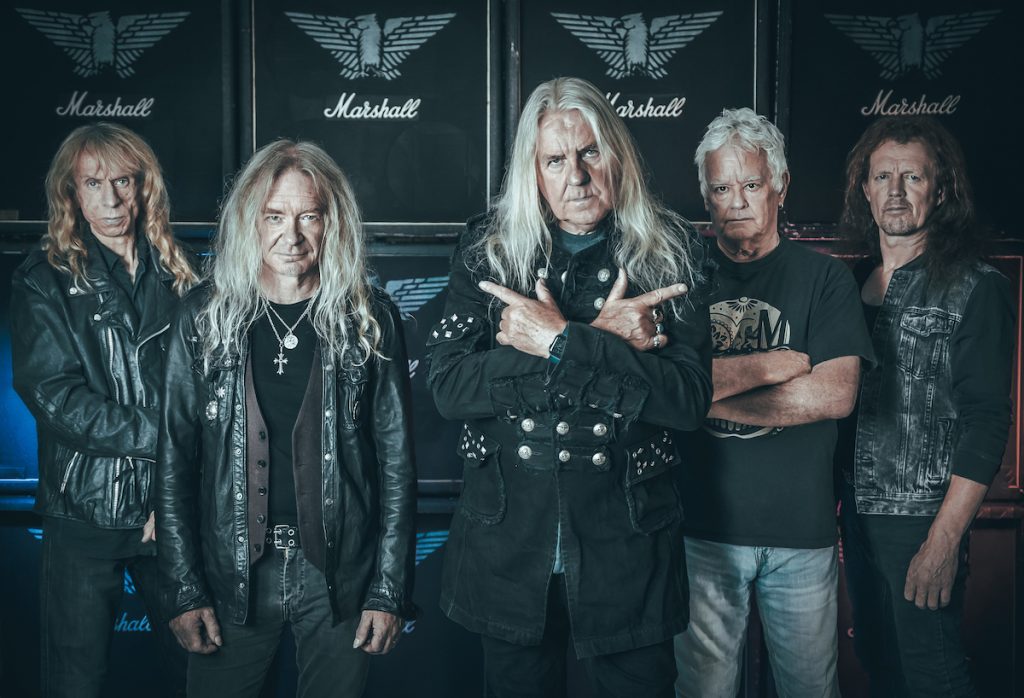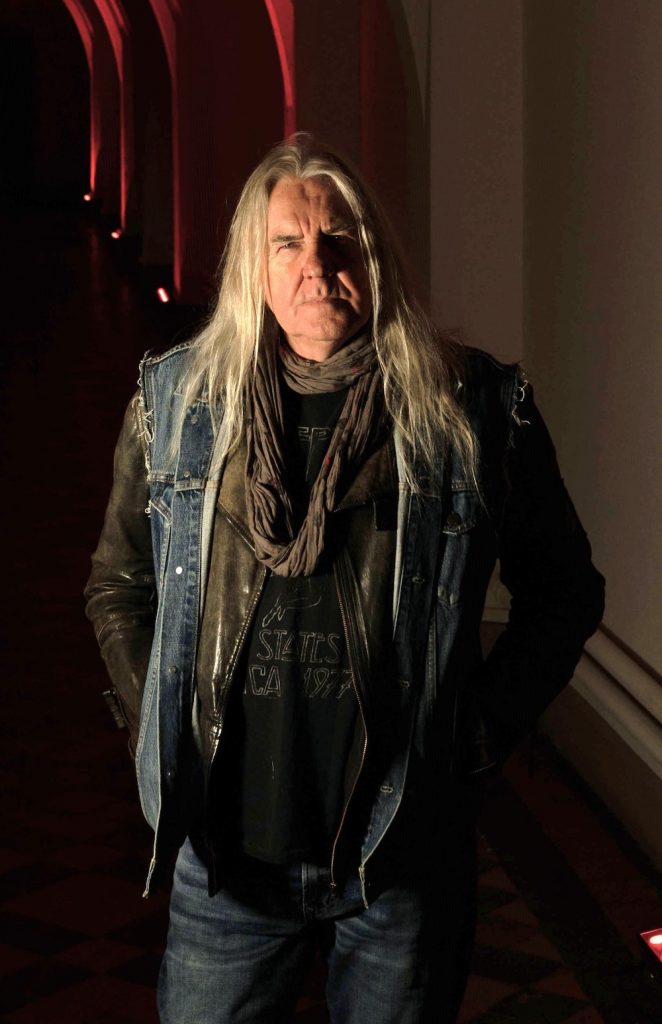Culture
Biff Byford reflects on nearly five decades of Saxon
By: Nicholas Kobe
Posted on:
MORGANTOWN, West Virginia (WOUB) – As a progenitor of classic British heavy metal, Saxon is one of the crucial pieces in shaping metal as we know it today.
Since their formation in 1975, the band has released 24 studio albums including some of the most beloved records to come out of the New Wave of British Heavy Metal such as Deinm and Leather, Wheels of Steel, and The Crusader.
After a long period of success in the ’80s, Saxon remained popular in the UK, going steady and resurging in recent decades, releasing a consistent stream of new music. January saw the release of Hell, Fire and Damnation – the latest studio album from Saxon, and proof of the continued legacy and staying power of the metal legends.
WOUB’s Nicholas Kobe spoke with Saxon vocalist Biff Byford ahead of Saxon’s regional stops on their Hell, Fire and Damnation tour with support from Uriah Heep. These stops include the Metropolitan Theatre (371 High Street) in Morgantown, WV on Sunday; Saturday, May 11 in Cleveland at TempleLive (3615 Euclid Avenue); and Thursday, May 16 at the Peoples Bank Theatre (222 Putnam Street).
Find a transcript of their conversation, edited for length and clarity, below.

Biff Byford: Hell, fire, and damnation. That track and the new album. Yeah, that’s summing it up at the moment.
You feel like that song or the new album in particular really encapsulates Saxon?
Byford: I think it encapsulates where Saxon are at this point in time. Yeah, definitely.
And how would you describe where you are at this current point in time?
Byford: Well, we’re at a great crossroads because we feel we’ve made a fairly magical album this time. I don’t know how we got that, but we just came together. We have great chemistry and great songs. I don’t know if we’re going to better this one or not, but I think we’re going to try. I think we’re going to try it for one more album, to get a better one. The thing is we’re songwriters, so we’re always trying to write the perfect song or make the perfect album. I think you can never achieve that, but I think trying is really good fun.
The thing is we’re songwriters, so we’re always trying to write the perfect song or make the perfect album. I think you can never achieve that, but I think trying is really good fun. – Biff Byford
What’s something that’s changed over the years about how you write songs?
Byford: Not a lot actually. I’m the only guy that writes lyrics and everything seems to fall into my pot. So it’s me that sort of picks out the guitars or the sections that sound great and then we’ll work together and put melody and arrangements together. I think when you have a good song you want to roll. If you’ve got a good title and a good hook, like There’s Something in Roswell. I think that as soon as I place the verse, and melody the first line, Fire In the sky Over New Mexico I think it more or less writes itself. You just have to believe in yourself and go for it really.
Was there anything in particular on the lyrical end that inspired you while you were writing this new record?
Byford: Well, I’ve been delving into history on this record, which is a bit of a British thing really. So yeah, I’ve been delving into history, so quite a lot of it’s history. There’s a bit of American history in there, Witches in Salem and There’s Something in Roswell, and a bit of Chinese with Kublai Khan and the Merchant of Venice. I love history and it’s really interesting to write about and it suits this metal genre as well. There are some great titles you can pull from history.
Yep. I mean you you guys also did the song with Amon Amarth, who also pulled from history quite often.
Byford: Yeah, definitely Amon Amarth is one of the newer bands that do it as well. I mean a lot of it’s Saxon history, but in some respects that was British history as well. So is Viking history which is pretty British as well. I co-wrote a song with them, Saxons and Viking. It’s a great track actually. We’ve known them for quite a long time.
That’s great to hear. So obviously you guys are gearing up to start touring this record. How has the way that you guys tour, or your general attitude about touring changed over the years that you guys have been doing this?
Byford: Yeah, I don’t think so. You just get on the plane and go, you can’t stop it. It is an ever-rolling thing. Once you start the tour, if you can stay fit and not get ill and keep your health in good shape, then it’s just a rolling thing. We just do our thing, we get on a plane, get off the plane, go and play the show, meet the people, play our song, and have a laugh. It’s just a bit like going out with a bunch of friends every day. That’s how it works with Saxon. We don’t have separate buses and separate dressing rooms. We’re pretty much family together.

Byford: Well, it is gone into lots of subgenres, there’s millions of different titles. It’s all in that same heaviness, really. So I think it’s been good, actually. It’s come right round again actually, because a lot of people are now interested again in the sort of more British classic rock, that classic metal that we are writing. So yeah, we’re picking up a lot of new fans. They’re asking people to play us on the radio, they’re reading magazines, they’re checking us out on Facebook and Instagram. I think it’s all in a good place at the moment.
Yeah, it’s all just become this big thing that kind all feeds itself. Everybody wants to just check out all sorts of types of metal.
Byford: It’s a monster, mate. It’s like this album, it’s a monster so people can check it out. They’ve got a lot of freedom these days more so than in the eighties. In the ’80s, it was all driven by magazines and radio. Now it’s a lot of, it’s still radio obviously, but not so many magazines. A lot of online and a lot of its social media now. So it’s just pretty cool in that respect.
So you would say you prefer the freedom that people have to choose?
Byford: I think freedom is always good. I think you just have to be much better now. I think you have to be much better and write better albums at our age because there are a lot of young bands around who making great music. The music we make has to be even better really in some respects because waiting for us to fail, everybody’s waiting for all the old guys. They can’t hack it anymore. So we’re not going to go down that, we’re going to go down all guns blazing.
Absolutely. You’ve alluded to this a little bit, but I guess the last question I have for you is, what’s next for Saxon?
Byford: I think the future will be, I mean obviously, we are going to make another album. We’re already thinking about that now. I have a lot of titles in my book I haven’t used yet. So we’ve still got lots of inspiration, lots of chemistry left in the band. We have a new guitarist now in the band, an old-school guitarist, but he’s brought another dimension to the writing. We’re looking forward to making another album in a couple of years. I mean, we’ll be touring on this album into 2025. So we’re pretty busy this year and part of next year. So yeah, we’ll start putting some ideas together. I’m going to do another solo album, I think because they’re always good fun. I get to play with some friends who aren’t in the band. That’s always good.

